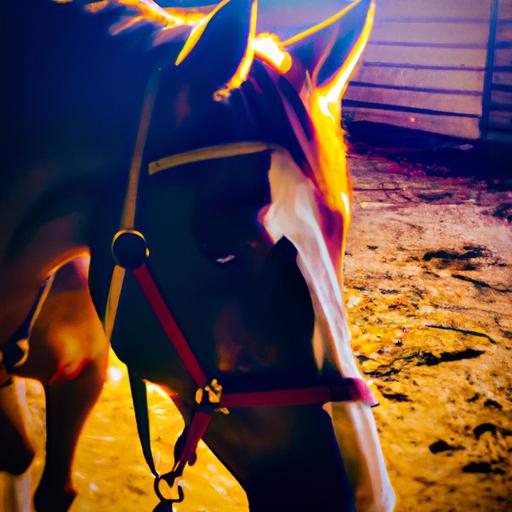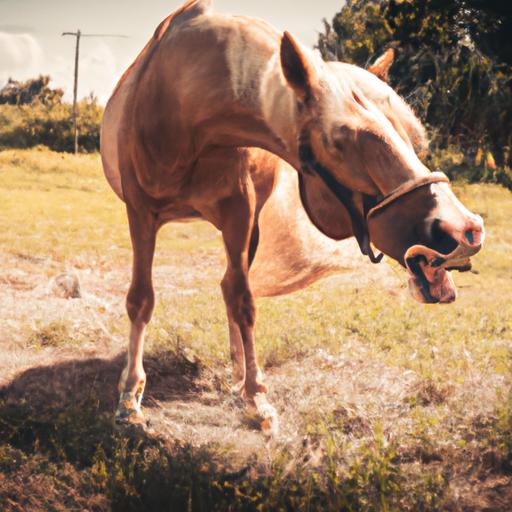Discover effective strategies to provide comfort and support to dying horses. Alleviate pain, explore palliative care options, and veterinary support for dying horse behavior.
As horse owners and enthusiasts, we share a profound connection with these magnificent creatures. We witness their strength, grace, and loyalty, forming bonds that often last a lifetime. However, there comes a time when we must face the inevitable reality of a horse nearing the end of its journey. Understanding dying horse behavior becomes essential in ensuring the well-being and comfort of our equine companions during their final stages.
When a horse’s health deteriorates, it exhibits various signs that indicate its declining condition. Physical symptoms such as weight loss, difficulty in movement, and changes in appetite may become evident. However, equally important are the behavioral changes horses display as they approach the end of their lives. These behavioral shifts can serve as crucial indicators of their overall well-being and may guide us in providing appropriate care and support.
But why is it so important to comprehend a dying horse’s behavior? By recognizing these specific behaviors, we can address their needs effectively, offering comfort and relief during their final moments. Whether it be providing pain management, ensuring a peaceful environment, or offering emotional support, understanding the intricacies of dying horse behavior empowers us to make informed decisions that prioritize their welfare.
In the following sections, we will delve deeper into the common signs of dying horses, explore the factors that influence their behavior during this process, and discuss the emotional and psychological aspects they may experience. We will also provide guidance on how to provide comfort and support to dying horses, as well as coping strategies for owners and caretakers following the loss of their beloved equine companions.
So, let us embark on this journey together, as we unravel the mysteries of dying horse behavior and discover the profound impact it holds on equine health and the human-animal bond.
Stay tuned for Section 2, where we will explore the common signs of dying horses and how to recognize them.
Recognizing Common Signs of Dying Horses

When a horse’s health begins to decline, it manifests various physical symptoms and changes in behavior and demeanor. By being attentive to these signs, we can better understand their condition and provide the necessary care. Let’s explore the key indicators of a dying horse:
Identifying Physical Symptoms of Deteriorating Health
Physical symptoms can be early signs of a horse’s declining health. It is crucial to carefully observe any changes in their appearance, as they can provide valuable insights into their well-being. Look out for the following indications:
- Weight Loss: A noticeable decrease in weight may suggest that the horse is not receiving adequate nutrition or is experiencing difficulty in digesting food.
- Loss of Muscle Tone: If the horse’s muscles appear to be wasting away, it could be an indication of underlying health issues.
- Abnormal Vital Signs: Irregularities in a horse’s heart rate, respiration, or body temperature may signify a deteriorating condition.
- Poor Coat Condition: A dull, rough, or patchy coat could be a sign of a horse’s declining health.
- Lethargy and Weakness: If the horse displays a lack of energy, struggles to stand, or exhibits weakness, it may be indicative of an underlying health problem.
Observing Changes in Behavior and Demeanor
Behavioral changes during the dying process can range from subtle to overt. Understanding these changes can help us gauge the horse’s comfort level and overall condition. Pay attention to the following behavioral indicators:
- Reduced Appetite: A loss of interest in food or a significant decrease in the amount consumed may indicate the horse’s deteriorating health.
- Changes in Social Interactions: Horses are social animals, and alterations in their interactions with herd members or humans may suggest discomfort or distress.
- Altered Posture and Movement: A horse’s gait, balance, or coordination may become affected as its health declines.
- Increased Restlessness or Agitation: Restlessness, pawing the ground, or constant shifting may signal pain or discomfort.
By keenly observing these physical symptoms and changes in behavior, we can gain valuable insights into a horse’s deteriorating health. However, it is important to note that every horse is unique, and these signs may vary. Consulting with a veterinarian is always advised to ensure an accurate assessment and appropriate care.
In Section 3, we will explore the factors that influence dying horse behavior and how they contribute to the overall process.
Factors Affecting Dying Horse Behavior
Understanding the factors that contribute to a horse’s behavior during the dying process is crucial for providing appropriate care and support. Several key factors come into play, influencing how a horse behaves in its final stages of life. Let’s explore these factors in more detail:
1. Age:
Age plays a significant role in a horse’s behavior during the dying process. Older horses may exhibit different behaviors compared to younger ones. As horses age, their bodies become more susceptible to various health conditions and their overall strength and resilience may decline. This can result in changes in behavior, such as decreased mobility, increased fatigue, or a decrease in social interactions. Recognizing these age-related changes can help us tailor our approach to providing comfort and support to the horse.
2. Underlying Health Conditions:
Just like humans, horses may suffer from underlying health conditions that can impact their behavior as they near the end of their lives. Conditions such as organ failure, chronic pain, or degenerative diseases can cause discomfort and affect a horse’s behavior. It is essential to work closely with a veterinarian to identify and manage these conditions effectively. By addressing the root causes of distress, we can enhance the horse’s quality of life in its final moments.
3. Environmental Factors:
The environment in which a dying horse resides can greatly influence its behavior. Horses are highly sensitive animals, and changes in their surroundings can evoke different responses. Factors such as stable conditions, temperature, noise levels, and the presence of familiar companions can impact a horse’s stress levels, comfort, and overall behavior. Creating a calm and nurturing environment that minimizes stressors is crucial in ensuring the horse’s well-being and peace during this sensitive time.
Understanding these factors and their influence on a dying horse’s behavior allows us to provide tailored care and support. By considering the horse’s age, addressing underlying health conditions, and creating a soothing environment, we can ensure a peaceful and dignified transition for our equine companions.
Stay tuned for Section 4, where we will explore the emotional and psychological aspects of dying horses.
Emotional and Psychological Aspects of Dying Horses
A Rollercoaster of Emotions: Nearing the End of Life
As horses approach the end of their lives, they undergo a range of emotional experiences that can be both challenging and profound. Just like humans, horses possess the capacity to feel fear, sadness, and even a sense of acceptance. Understanding these emotional aspects allows us to provide the necessary support and comfort during this delicate phase.
Examining the Emotional Journey: Each horse’s emotional journey during the dying process is unique, influenced by factors such as their personality, past experiences, and overall well-being. Some horses may exhibit signs of anxiety or restlessness, reflecting their struggle to come to terms with their deteriorating health. Others may display a sense of calm or resignation, embracing the inevitable transition.
The Power of the Bond: The bond between a horse and its owner or companions can have a profound impact on the horse’s emotional well-being during its final moments. Horses often form strong connections with their human caretakers and stable mates, relying on these relationships for support and security. As their health declines, the presence of trusted individuals can offer reassurance and alleviate any anxiety or distress they may be experiencing.
Providing Emotional Support: Nurturing the Human-Animal Connection
Recognizing the emotional needs of dying horses not only benefits them but also provides solace to their owners and caretakers. The human-animal bond is a powerful force that can bring comfort and healing during these challenging times.
Creating a Peaceful Environment: Surrounding the horse with familiar sights, sounds, and scents can help create a sense of tranquility. Maintaining a calm and soothing atmosphere within their living space can ease their emotional distress and promote a sense of security.
Spending Quality Time: Spending time with a dying horse can be a deeply emotional experience for both the horse and the owner. Engaging in gentle grooming sessions, providing soothing massages, or simply sitting quietly by their side can offer immense comfort and reaffirm the bond between human and horse.
Seeking Support: It is essential for owners and caretakers to seek emotional support from friends, family, or support groups within the equine community. Sharing experiences, fears, and grief can provide solace and help navigate the complex emotions that arise when facing the loss of a beloved horse.
By acknowledging and addressing the emotional and psychological aspects of dying horses, we can ensure their final moments are filled with love, compassion, and understanding. In Section 5, we will delve into practical strategies for providing comfort and support to horses during their last stages.
Conclusion
Throughout this journey of understanding dying horse behavior, we have gained valuable insights into the significance it holds in equine health and the emotional connection we share with these magnificent creatures. By recognizing the common signs of a dying horse and understanding the factors that influence their behavior during this process, we are better equipped to provide comfort and support in their final stages.
When a horse is nearing the end of its life, it is crucial to focus on alleviating their pain and discomfort. Effective strategies such as providing a calm and peaceful environment, ensuring proper pain management, and offering palliative care options can greatly enhance their well-being during this challenging time. Consulting with a veterinary professional who specializes in end-of-life care can provide invaluable guidance and support in making decisions that prioritize the horse’s comfort.
As horse owners and caretakers, we must also acknowledge the emotional and psychological impact that the loss of a beloved equine companion can have on our own well-being. Coping with the grief and seeking support from the equine community can aid in the healing process and help us navigate through this difficult time.
At Horsemasterypro.com, we understand the profound bond between horses and their human counterparts. Our mission is to provide resources and guidance to horse owners and enthusiasts, ensuring the well-being of both equines and their caretakers. Remember, as we honor the memory of our beloved horses, we can continue to cherish the lessons they taught us and the love they brought into our lives.
Thank you for joining us on this exploration of dying horse behavior. Together, let us continue to care for our equine companions with compassion, understanding, and unwavering love.
Stay connected with Horsemasterypro.com for more insightful articles, tips, and resources to enhance your understanding and connection with horses.


